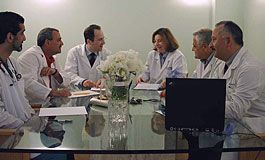
Dr Dork has been wary of even approaching this topic.
Abortion.
This is an ethical minefield.
Dr Dork is not an obstetrician. He is also not a woman.
He is not an expert on exactly what point a termination remains permissible. He doesn't agree with
this, though.
There is an interesting medicopolitical debate raging in Australia at present.
It is about RU486.
RU486, or
Mifepristone, is principally an antiprogesterone. A type of hormone. It is fundamentally used as a medical, as opposed to surgical, method of inducing first trimester abortion, and also as an alternative to postcoital contraception.
Post-coital contraception, also known as "the morning after pill" (Postinor-2), can be purchased over the counter from pharmacists in Australia. Dr Dork thinks this is a problem. For one thing, those engaging in unsafe sexual behaviour are at risk of various STDs. Including HIV. This warrants professional counselling and education of the risks involved, so that people can make informed choices.
A chemist, on a shop floor, is neither qualified to do this, nor in a situation to do this with any modicum of privacy.
Abortion law is
very complicated in Australia. It varies greatly from state to state. In some states, 1st trimester abortion is permissible only if there is endangerment of the physical or mental health of the prospective mother. In other states, it is permissible if there is "social or family risk", with the proviso that "counselling" of some form is given in regards to risks of abortion, and the risks of continuing pregnancy.
It is all very confusing. To cut through all the 'bull'...women in Australia have been able to obtain surgical abortions, if they so desire, quite easily, for decades. It is not for Dr Dork to pass judgement on this.
The issue of late has been regarding an alternative method for an already accepted procedure in Australian society. Some women, if they decide to abort a pregancy early, are at less risk of harm if they choose RU486 over surgical abortion.
There is little evidence which option is generally better, from recent reviews of the research evidence,
here and
here.
The issue has become more than a matter of science. Generally, matters in regards to approval of medications for use in Australia are decided by the Therapeutic Goods Administration, or TGA. The TGA serves as a risk management review authority of any medication or medical device. It is staffed by scientists, epidemiologists, and other experts in the relevant fields.
The problem with RU486 is that, in 1996, legislation was introduced by our current highly conservative government, still in power, enabling the health minister to veto the TGA on certain matters. Such as RU486. Our health minister,
Tony Abbott, is a lawyer with a previous background in economics. He has no training or experience in any scientific discipline whatsoever, let alone health matters.
He is also a staunch Catholic.
A private Members bill to return the decision making process on medical abortion to the TGA is in the process of passing through the various stages of approval in the Australian parliament, and appears likely to succeed. It has become what we refer to as a conscience vote. Even from Mr Abbotts own party, the majority of female politicians have voted in favour of removing his veto.
Dr Dork doesn't like politicians deciding national matters on the basis of their religion. This is a very dangerous and slippery slope to tread.
Church and State should remain separate. Theocracy is a form of dictatorship.
Note: Dr Dork apologies to his NotifyList members...the service seems to be misbehaving.





 Dr Dork has been wary of even approaching this topic.
Dr Dork has been wary of even approaching this topic.










